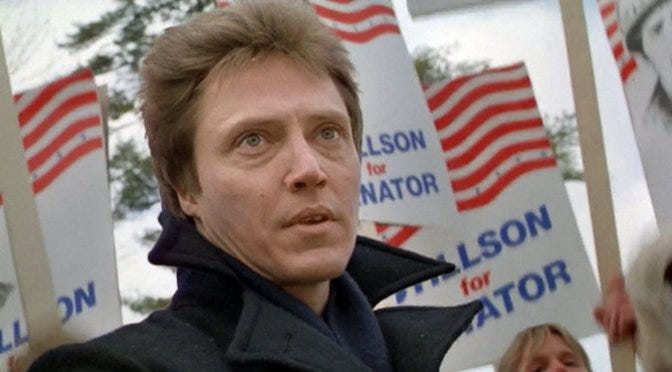
Why not take a break from wall-to-wall, nail-biting election coverage with some examples of how election stories are told? Who’s ready?
Please clap.
Kicking things off with an eye from abroad, Ian Mantgani rounds up 10 American films about elections. The mix of documentaries, rockumentaries, and fiction offers plenty of options for individual vibes.
You can read 25 more great scripts about elections in this week’s collection for Weekend Read.
Jody Avirgan, Kellie Carter Jackson, and Nicole Hemmer look at the earliest days of political advertising, when candidates were still averse to pitching themselves as a product. But soon the influence of television and film lead to more charismatic politicians, and more dramatic concepts. Also included: LBJ’s “Daisy” ad, which was seen by millions, but only paid to air a single time.
There’s a blurred line between fictional politicians and ones in the real world, and it’s not a one-way street. Juliette Holder digs in to the question of why so many female politicians, regardless of party, want to be seen as a real-life Leslie Knope.
Point-Counterpoint on Bulworth: Reagan Ross sings its praises, focusing on its depictions the influence of corporate power and what a populist, class-conscious political campaign could look like. Joe Reid takes a more ambivalent look back at the film, arguing it is too naive to be applicable to modern politics.
And a reminder that elections aren’t just about candidates on the campaign trail, but about the voters and the people who work to register them and protect their rights. Film producer and former member of SNCC, Judy Richardson points out the crucial differences in framing and facts between Mississippi Burning and the true events it was based on:
After I listed my complaints about the ahistorical characterization of both the FBI and Movement activists, the producer turned toward me and, smiling in a conspiratorial way, said: ‘Look, you’re a filmmaker. You understand dramatic license.’ I responded, ‘Yes, I do. But what you’ve done is similar to making a film about France during World War II and making the Vichy government, which collaborated with the Nazis, the heroes; and making the fighters of the French Underground, which lost their lives fighting the Nazis, ineffectual cowards. You don’t get to have that kind of dramatic license.’
👋 Are you new here?
Inneresting is a weekly newsletter about writing and things that are interesting to writers. Subscribe now to get more Inneresting things sent to your inbox.
Previously on Inneresting…
In case you missed it, in last issue’s most clicked link Scarecrow Video put out a call to raise funds to continue being an oasis for physical media.
What else is inneresting?
The Nintendo Music App: Sure to cause people to drive more aggressively when listening to the Mario Kart soundtrack.
Malmrose Projects dissects Gary Larson’s “Cow Tools” comic, and how it anticipated internet humor and a world “where meaning was secondary to content.”
Maybe we need fewer billionaires owning newspapers? Heather Hollingsworth looks at the example of when universities purchase or partner with existing local news organizations.
And that’s what’s inneresting this week!
Inneresting is edited by Chris Csont, with contributions from readers like you and the entire Quote-Unquote team.
Are you enjoying this newsletter?
📧 Forward it to a friend and suggest they check it out.
🔗 Share a link to this post on social media.
🗣 Have ideas for future topics (or just want to say hello)? Reach out to Chris via email at inneresting@johnaugust.com, Mastodon @ccsont@mastodon.art, or Bluesky @ccsont.bsky.social




